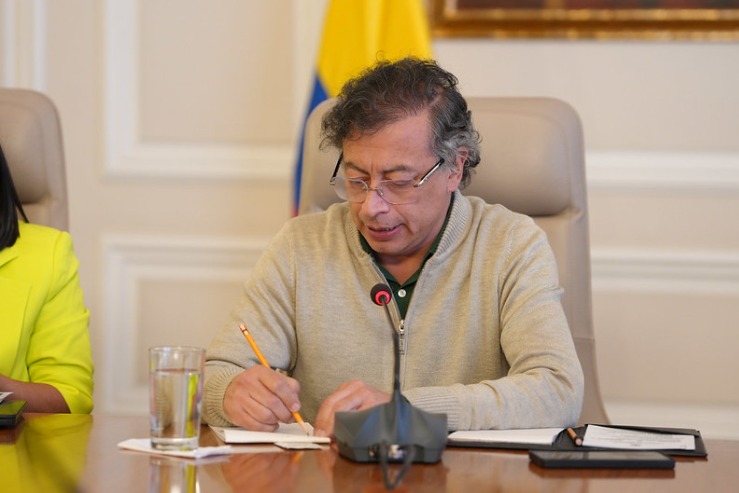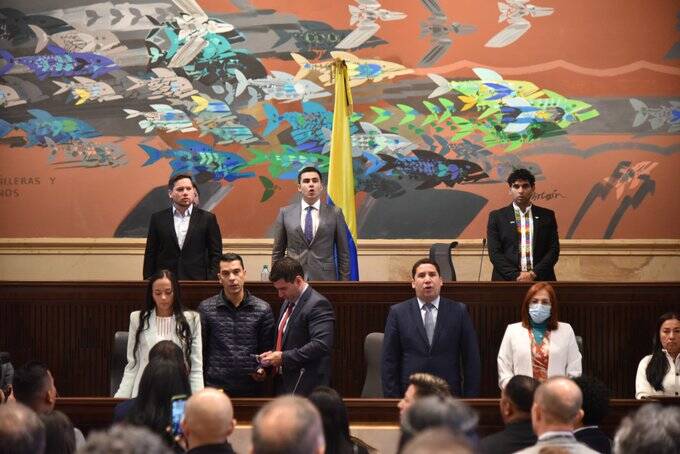The attempt to ignore the agreements of the House speaker that could affect Gustavo Petro's trial in the accusations commission

This Tuesday, Gustavo Petro's administration announced that it will run Julián López, of the U Party, as its candidate for the House speakership. The Ministry of the Interior confirmed this in the afternoon, and a photo was later published showing the recipient of the presidential nod, holding Petro's hand.
"Today we held a successful and productive meeting with President Gustavo Petro, during which we exchanged ideas, shared our vision for the country, and discussed the priorities of the upcoming legislative agenda," López said in his tweet.

President Gustavo Petro addressed the decree changing the powers of the Council of State. Photo: Office of the President
The decision could calm the ongoing struggle in the Chamber to replace Jaime Raúl Salamanca. However, it's unusual for the "presidential blessing" to be so explicit, so some sectors have seen the move as a way to quell other parties' attempts to challenge the president's position.
According to the agreements at the start of Congress, the presidency for the fourth year was due to be held by Radical Change. However, as this group moved into opposition, the majority decided not to honor it. To avoid a total disregard for the 2022 agreement, it was decided to hand over the presidency to the Partido de la U (United Left Party).
At the beginning of the four-year term, "Cambio" and "La U" joined forces to negotiate agreements. They combined their votes to achieve a better distribution ratio. They called this alliance "CRU." Thanks to this, they were able to win the final year of the House speakership, defeating the Conservatives.
Since they won't give the presidency to Vargas Lleras's party, as the Petro administration doesn't want a direct opponent leading the organization that has been most favorable to them during these three years in office, they'll try to give the position to the Partido de la U (U Party). However, there are several sectors that are not happy with the move.

The plenary session of the House of Representatives. Photo: Press Office of the House of Representatives.
The first is Radical Change, which believes the agreements are not being fulfilled. The conservatives and some members of the Historic Pact are in the same camp. These last two groups argue that if "La U" takes office, the agreements will not be fulfilled, and they are therefore within their rights to seek the office for themselves.
Juan Carlos Wills would be running for the Blues, while Alejandro Ocampo, the leftist party, would be seeking to retain that position. However, if either of them were to win the position, the government and much of the left fear that it would constitute a total disregard for the agreements, which would also open the door to a breach of everything else agreed upon for this past year.
If López or another member of the U party wins, the government can sell the thesis that they fulfilled what was agreed in 2022. However, the other two names are not part of the CRU alliance, and those in the Executive Branch and among their closest allies know that in Congress, "if one agreement is broken, they all are broken."
In this final legislative year, the Historic Pact is responsible for the First Commission and the Accusations Commission, President Petro's natural judge. If they violate the agreements in plenary session, they know they will be challenged for both positions.
As for the First Branch, there are several government bills that will go through this and are making their final attempt to be approved before the end of the administration. However, the Executive Branch's special attention will be on the cell investigating the president. They know that surrendering control could be counterproductive in the final stretch of the administration.
The main fear expressed by the Executive Branch and the Historic Pact faction calling for the agreements to be maintained is that if they don't assume the presidency of the Accusations Commission, an opponent like Carlos Cuenca could be elected.
Some members of the leftist group who spoke with EL TIEMPO even suggested that the president could even order the toxicology test requested by the opposition in response to Álvaro Leyva's letters, in which he claims the president is known to have problematic substance use. He could also accelerate the various investigations Gustavo Petro is conducting within that cell.
Therefore, although Representative Alejandro Ocampo claims he would have the votes to be the new Speaker of the House and thus ensure that a government sympathizer leads the plenary session during his final term, the Executive Branch and its allies are reluctant to take this option seriously and prefer to modify agreements as little as possible to avoid further breaches that could directly affect the final stretch of the Petro administration.
Juan Sebastian Lombo Delgado
eltiempo





